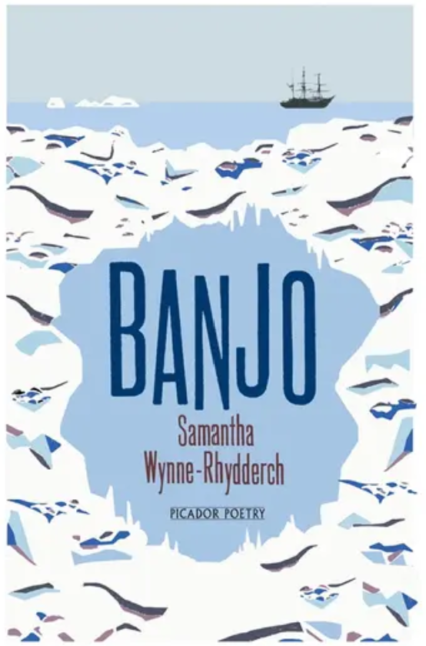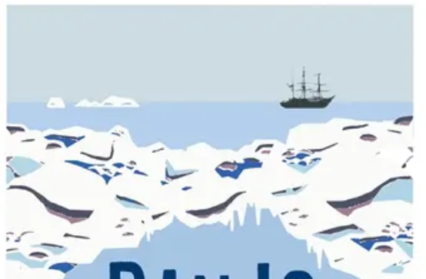Carl Griffin sat down to interview Samantha Wynne-Rhydderch, a poet who has published three collections, the latest of which, Banjo, was shortlisted for Wales Book of the Year.
Carl Griffin: Samantha, your latest collection, Banjo, celebrates the centenary of Captain Scott’s arrival at the South Pole. How did you get interested in the subject of the early Antarctic pioneers, and how did historical documented reactions become an ‘obsession’?
Samantha Wynne-Rhydderch: I’ve always been fascinated by journeys, physical journeys as well as journeys of the mind and this was one journey which had stayed with me after reading about it as a teenager and something which I wanted to explore in poetry. For a long time I wasn’t sure that I was up to it, so after writing the collection in 1999-2001, I then left it in a drawer for almost ten years to allow it to ‘mull’. I often think that doing this is like letting work fall to the bottom of the seabed and that once you retrieve it, it can be much more interesting because it has had the time to bump around with other ideas and experiences which have come your way as a writer.
Once I’d got going on it, I found myself becoming very involved in the intricacy of the story, to the extent that I almost felt like one of the characters in the narrative. With each of these poems there was a slightly different level of detail required, so I had to constantly be on my guard not to allow the poems to become bogged down with historical information, as the danger is you can end up overloading a poem with facts and you will lose your reader. It was always a balancing act between weighing down the poem with too much historical detail and giving the reader enough context with which to engage with the narrative of the poem.

Banjo was shortlisted for Wales Book of the Year (The Roland Mathias Prize). How important is it for Welsh authors to get their own space and recognition, rather than being swamped by the better-known poets from the rest of the UK? The fact that one book from the three short-listed was published by a publisher based outside Wales is surely a good sign.
I think it’s always good when there is a range of publishers represented on any shortlist, whether it’s Wales-wide or UK-wide. It doesn’t seem to me that Welsh poets are ‘swamped’ by better-known poets from the rest of the UK – Seren, for example, are going from strength to strength in terms of the variety and quality of poetry they publish. With Amy Wack at the helm, Seren have enjoyed a winning streak of short-listings and prizes over the last twenty years. Interestingly both the other poets on this year’s WBOY shortlist (Deryn Rees-Jones and Rhian Edwards) are published by Seren and had already both achieved well-deserved UK-wide recognition by being short-listed for the Forward Prize and (in Deryn’s case) the TS Eliot. So I’d say that Welsh poets are healthily represented on the UK-wide scene!
In your article ‘Spadework’, you talk about the relationship between poetry and gardening. Do you disagree with the notion that the only connection between poets and nature is that poets use nature as material for their work?
When it comes to the garden/nature inspiring individual poems, that’s a really good point because I often find that the starting point for a poem can be very far removed from the way it turns out. And this is no bad thing. No matter how far a poem may travel from its initial line or idea, all the twists and turns on this journey are important stepping stones for reaching the final couplet. This is very exciting as a writer, because you simply never know where the road will take you and how the poem will end, which goes back to what I was saying about journeys in response to your first question. You can be taken by surprise three-quarters of the way into a poem and that, I think, is when you know the poem is really working. But I do believe that you need to have mapped out 80% of the poem in order for it to have enough structure to have the capacity to surprise you in its final few lines. I find that even if a poem appears totally unconnected to its catalyst, one root, one idea or one word from the initial starting point will remain in the final version.
Speaking of which, your garden overlooks Cardigan Bay? How often has that inspired individual poems, even if they ended up having no evident connection to Cardigan Bay?
I’ve no doubt that the landscape I live in must shape my work, although I am probably too close to it to be able to analyse how!
During your residency at the National Wool Museum in Dre-fach Felindre, you intended to work on your fourth collection of poetry, on the theme of textiles. How did that pan out?
I have been writing a pamphlet of poems entitled Lime & Winter which came out of this Leverhulme-funded residency. I’ve nearly completed it and it’s due to be published next Spring. I felt very blessed to be able to work at the National Wool Museum for six months and am grateful to the Leverhulme Trust for having put faith in me by awarding me the funding to spend time with the weavers of west Wales and to collaborate with the museum’s talented Education Officer, artist Joanna Thomas. Talking to some of the older weavers was a real pleasure: I learnt so much about wool and weaving that I even had a go on a hand loom by the end of the year and managed to weave a scarf! I find textiles so thrilling that I was in seventh heaven at the museum.
Would some poets not have died of boredom?
Given the amount of noise that some of those machines make it is hardly a quiet environment! I lived for some years in Lancashire when I was growing up, against the backdrop of the mills so it was no surprise to me that I would, at some point, write out of that experience. Another point to bear in mind is that plenty of people visited the museum to attend my writing surgeries and workshops and I made several new friends, so it was quite a sociable time as well as being a reflective place in which to write. There are things I would never have come across had I not spent a period of months there, rather than just zipping in and out for the day: have you ever been up to the attics in the National Wool Museum? There are poems and little birds drawn by the wool sorters who worked there years ago. I would never have encountered these if I hadn’t allowed myself to be surprised by the environment. And this goes back to allowing oneself to be surprised by the poem and where it will take you.
Banjo by Samantha Wynne-Rhydderch is available from Pan Macmillian.
Also by Samantha Wynne-Rhydderch: Not in These Shoes.
Carl Griffin has written many poetry reviews for Wales Arts Review.












